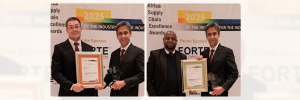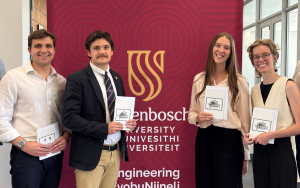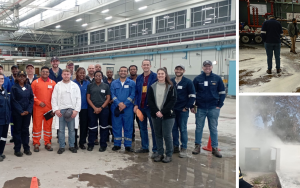
Electric Mobility Lab wins two prestigious Africa Supply Chain Excellence Awards
- Stellenbosch University’s Electric Mobility Lab won two Africa Supply Chain Excellence Awards for its diesel-to-electric bus conversion and solar-powered motorbike expedition.
The Electric Mobility Lab at Stellenbosch University’s (SU) Faculty of Engineering has been recognised with two top honours at the 2025 Africa Supply Chain Excellence Awards (ASCEA), celebrating groundbreaking African innovation in sustainable transport and talent development.
The Electric Mobility Lab took home the Outstanding Achievement Award in the Transport Category for its pioneering diesel-to-electric bus conversion, and the Winner Award in the Training and Talent Management Category for the remarkable Nairobi-to-Stellenbosch solar-powered electric motorbike expedition.
The ASCEA awards recognise outstanding achievements and innovations that strengthen supply chains across Africa, highlighting projects that deliver measurable impact and inspire future leaders in logistics, transport and sustainability.
Award 1: Diesel-to-electric bus conversion
In a first for South Africa, and a breakthrough for the continent, SU partnered with Rham Equipment, Golden Arrow Bus Services (GABS) and the South African National Energy Development Institute (SANEDI) to successfully convert a 2005 diesel commuter bus into a fully electric vehicle.
The project replaced costly imports with locally sourced and assembled components, extending the bus’s operational life while dramatically reducing emissions. The retrofit, carried out entirely in South Africa, trained local technicians and proved that high-impact transport innovation can be achieved within African supply chains, and is now being piloted on Cape Town’s streets.
“This project is more than just a cleaner bus – it is a blueprint for inclusive, African-led innovation that empowers communities while tackling climate change,” says Prof Thinus Booysen, a professor at the Faculty of Engineering.
Video: https://youtu.be/FfBaRLFZ6jg
Award 2: Nairobi-to-Stellenbosch solar ride
The second award celebrates a 6000 km journey from Nairobi, Kenya, to Stellenbosch, South Africa, on a solar-powered electric motorbike – charged entirely by the African sun.
The Roam Air electric motorbike, developed by Nairobi-based Roam Electric, was paired with a mobile solar charging solution designed by Stellenbosch University as part of the LEAP-RE research project. Built for Africa’s rugged transport landscape, these custom solutions enabled the team to travel through six countries in seventeen days without using grid electricity or fuel – relying solely on portable solar power and African ingenuity.
Along the way, they engaged with communities and universities, promoting sustainable transport and showcasing how African supply chains can deliver resilient, low-carbon mobility solutions. The expedition gained global attention, including coverage by the international news coverage company CNN.
“More than a remarkable endurance feat, the Nairobi to Stellenbosch solar ride is a symbol of what is possible when African ingenuity, collaboration and sustainable technology come together. It stands as a blueprint for future-ready mobility – resilient, clean and powered by African sun and home-grown skill,” adds Prof Booysen.
Video: https://intro.africa/story/electric-motorbike-ride-from-nairobi-to-stellenbosch/
Photograph: (first photo) Dr Stephan Lacock (left) and Prof Thinus Booysen. (second photo) Mr Fistos Mafisa (left) and Prof Thinus Booysen.



